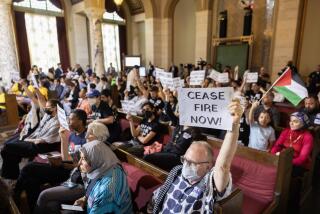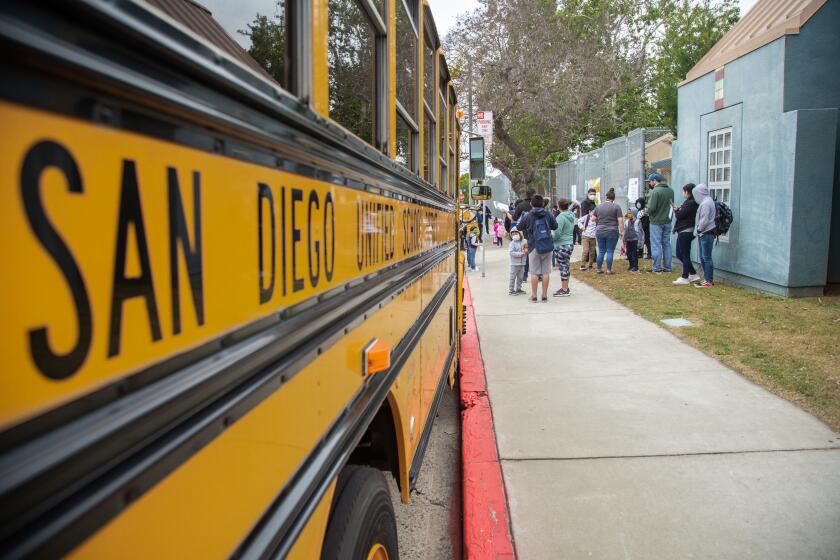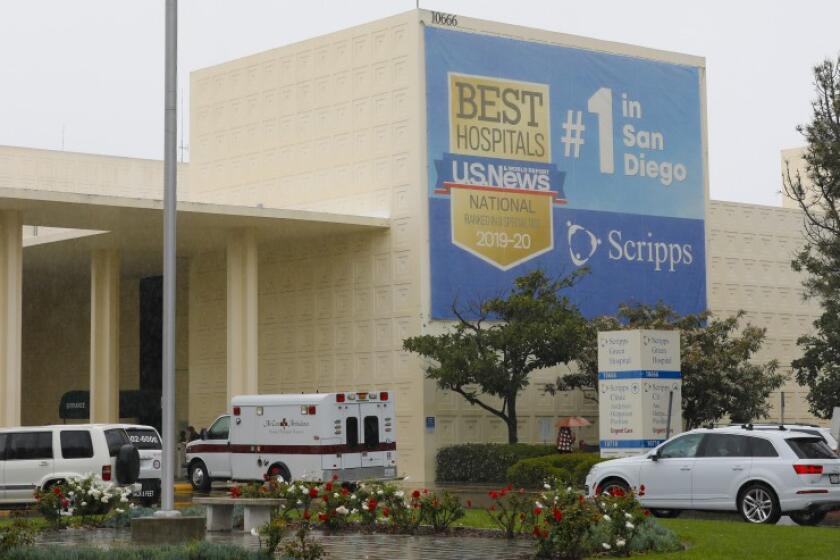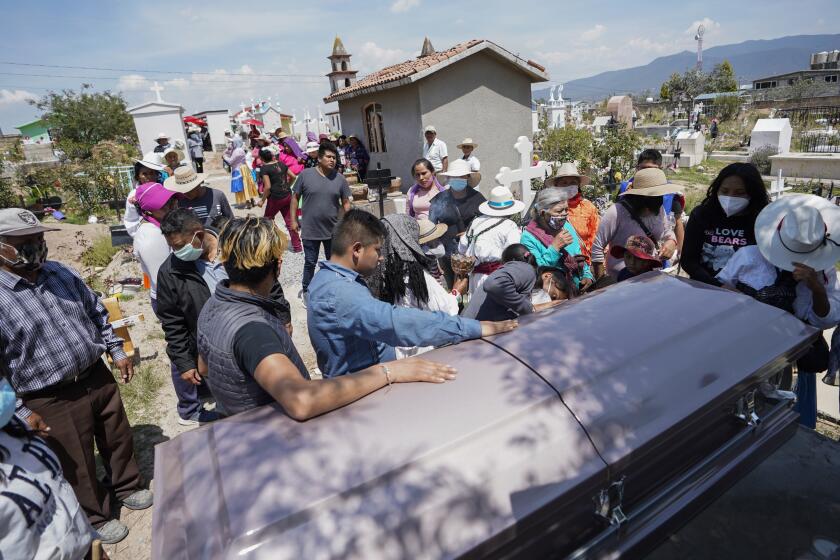Tensions grow between a San Diego church and the neighborhood around it
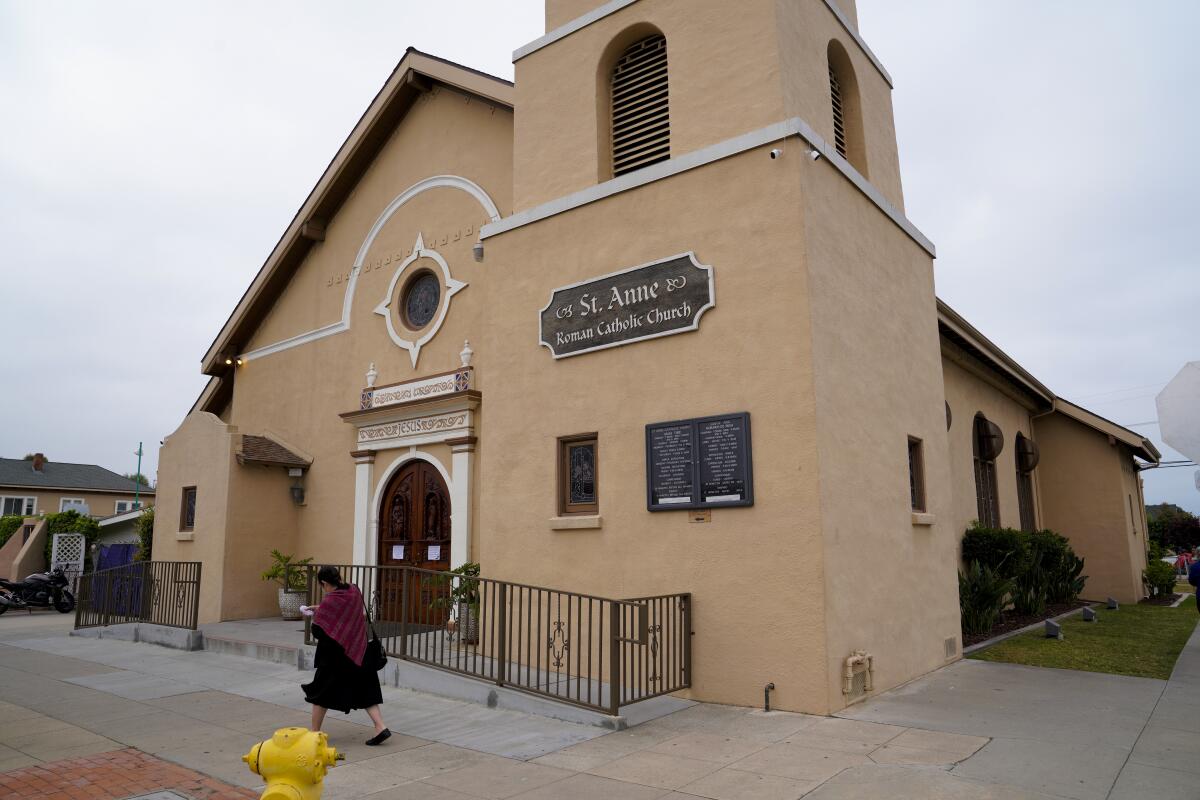
- Share via
SAN DIEGO — It started as an issue with parking on a block in San Diego’s Logan Heights.
Now tensions between a largely Latino neighborhood and a Catholic church have spilled over into social media conflicts, threats and calls for police intervention.
Logan Heights is a neighborhood of predominantly single-family homes, where Latino residents make up more than half the population. It’s bordered by the Barrio Logan community and Interstate 15. About 74% of Logan Heights households earn less than $60,000 a year, according to the San Diego Assn. of Governments.
St. Anne Catholic Church holds Mass in Latin seven days a week and has a large following of parishioners, mostly from outside the neighborhood. The church belongs to the Priestly Fraternity of St. Peter and, before pandemic restrictions stopped indoor Masses earlier this month, attendance averaged more than 200 people, the Roman Catholic Diocese of San Diego said. Now the church celebrates Mass in its courtyard.
Residents on Irving Avenue, across the street from St. Anne’s, recently described conflicts over parking and over Black Lives Matter signs, and instances of church members calling police on residents.
Fred Edwards, who lives near the church, said a woman from the church called the San Diego Police Department on his son, who is Black, as he sat in his parked car outside their home on June 26. Edwards said five officers responded, saying there was a complaint that the church was being threatened and that a woman was being harassed.
“I told the officers, ‘Y’all messed up.... There are people harassing the community, making false accusations,’ ” Edwards said.
A San Diego Police spokesperson said in an email last week that the department has received at least nine calls to the church’s address in the last year. The most recent was on July 15: a complaint that churchgoers were not wearing masks or practicing social distancing.
The department also has received calls that people wanted to protest at the church, the spokesperson said.
On June 24, a woman posted on Instagram that activists should organize a Black Lives Matter protest outside the church. The post read, “St. Anne’s doesn’t think Black Lives Matter and are staunch Trump supporters. These are white people who bought out the church from a Mexican family. I would like to see if we can organize a group to protest here ASAP.... Also they don’t believe coronavirus and have been congregating since the beginning of the Stay @ home orders.”
The post was shared across several social media platforms, including on an account by a well-known Catholic writer, Taylor Marshall, who said in July on One America News Network that protests and the desecration of Catholic statues across the country constitute a war on Christianity. Most of the comments to his post suggested that St. Anne’s needed to be protected.
Marshall did not respond to a request for comment.
The woman who posted about organizing the protest said she has received death threats, and her address was posted on Marshall’s Instagram account in the comments. Someone posted a photo of her and her children on Instagram with a caption calling her a “terrorist ... against God.”
She asked that her name not be published.
“I started getting private messages from people that they were going to kill me or shoot me,” she said. “One said, ‘Don’t get smoked, shorty.’”
The woman, who grew up in the community, moved away three years ago but said she still worries about her safety when she visits relatives in the neighborhood.
“They took away my sense of comfort,” she said. “My privacy is gone.”
Angelica Padilla, who lives in the neighborhood, said she believes there is tension in the community because people who go to the church are mostly white, and some have pro-Trump stickers on their cars. She said the church hasn’t made an attempt to reach out to residents who raised concerns.
Padilla is one of them. In April 2018, she wrote a review on a Facebook page for the church, saying people who attend it have “rude, bigoted [and] hateful” bumper stickers, take up residents’ street parking and don’t attempt to know the community, and she incorrectly stated that the church plays the national anthem every morning. (That music comes from a nearby naval base.)
“The people of this congregation are encroaching on this quiet neighborhood seven days a week and don’t bother to get to know the community that tolerates them. Outreach is trash,” she wrote.
Padilla admits that her review was harsh, but it didn’t merit the online harassment and in-person confrontations that followed, she said.
Padilla said she received at least a dozen messages from people on Facebook. One parishioner mailed her family’s landlord a letter asking that they be evicted, she said, and another approached and yelled at her mother to take down a Black Lives Matter poster from her yard.
“I feel uncomfortable, I feel unwelcome, I feel scared.... I don’t even feel comfortable walking my dog out,” Padilla said.
She said her landlord has been understanding, but the family is considering moving.
“I don’t want to move out of my neighborhood, but if I have to, to get away from these people, I will,” Padilla said.
Other neighbors said they, too, have experienced harassment and intimidation from people they believe attend the church. They said church leaders have failed to address their concerns.
The Rev. John Lyons, pastor at St. Anne’s, declined to answer questions last week. He directed queries to the Roman Catholic Diocese of San Diego.
Kevin Eckery, vice chancellor of communications and public relations for the diocese, said the group is aware of the tensions.
“I know parking is an issue at St. Anne’s parish,” Eckery said. “The parking lot is small, and parking does spill into the neighborhood.”
Eckery said a tweet went out June 24 encouraging a public protest outside the church but was deleted. The parish called police.
“Out of an abundance of caution, the parish informed SDPD of the tweet-threat,” Eckery said.
Lyons at the time wrote a letter to parishioners. “We ask that no one take any other action on his own initiative,” he wrote. “It would most likely only make matters worse.”
He encouraged members to “pray for those who have promoted this action against our parish.”
There has been a Catholic church in that location for decades, residents said, and it used to hold Masses in Spanish. During Christmas season it would host posadas, traditional dinners and reenactments of the story of Mary and Joseph.
In 2008, Bishop Robert Brom established St. Anne’s as an “extraordinary form” parish. Now people come from throughout the region to its Latin Masses.
In March 2016, a reviewer on Yelp complained that the church did not reflect the neighborhood.
A response from “St. A. of Anne’s Catholic Church” said, “I am sorry that you did not have a good visit to the parish. Please realize that St. Anne is the parish for the Latin Mass in the Diocese of San Diego. It can be confusing — it is a ‘Latin’ Mass not a ‘Latino’ Mass.
“There are members of St. Anne’s who are from the neighborhood, but it is not a neighborhood church. As a result it is correct to say the parish does not reflect the neighborhood, because it is not supposed to. It reflects the entire composition of San Diego.”
San Diego is 44% white, 31% Latino, 15% Asian and 5% Black.
On a recent Tuesday, at least 50 parishioners, most wearing face masks, celebrated early Mass in the church courtyard. They recited prayers in Latin, and women wore veils over their heads.
People parked in the parking lot on the side of the church and, when the lot was full, on the street.
Lopez-Villafaña writes for the San Diego Union-Tribune.
More to Read
Sign up for Essential California
The most important California stories and recommendations in your inbox every morning.
You may occasionally receive promotional content from the Los Angeles Times.


